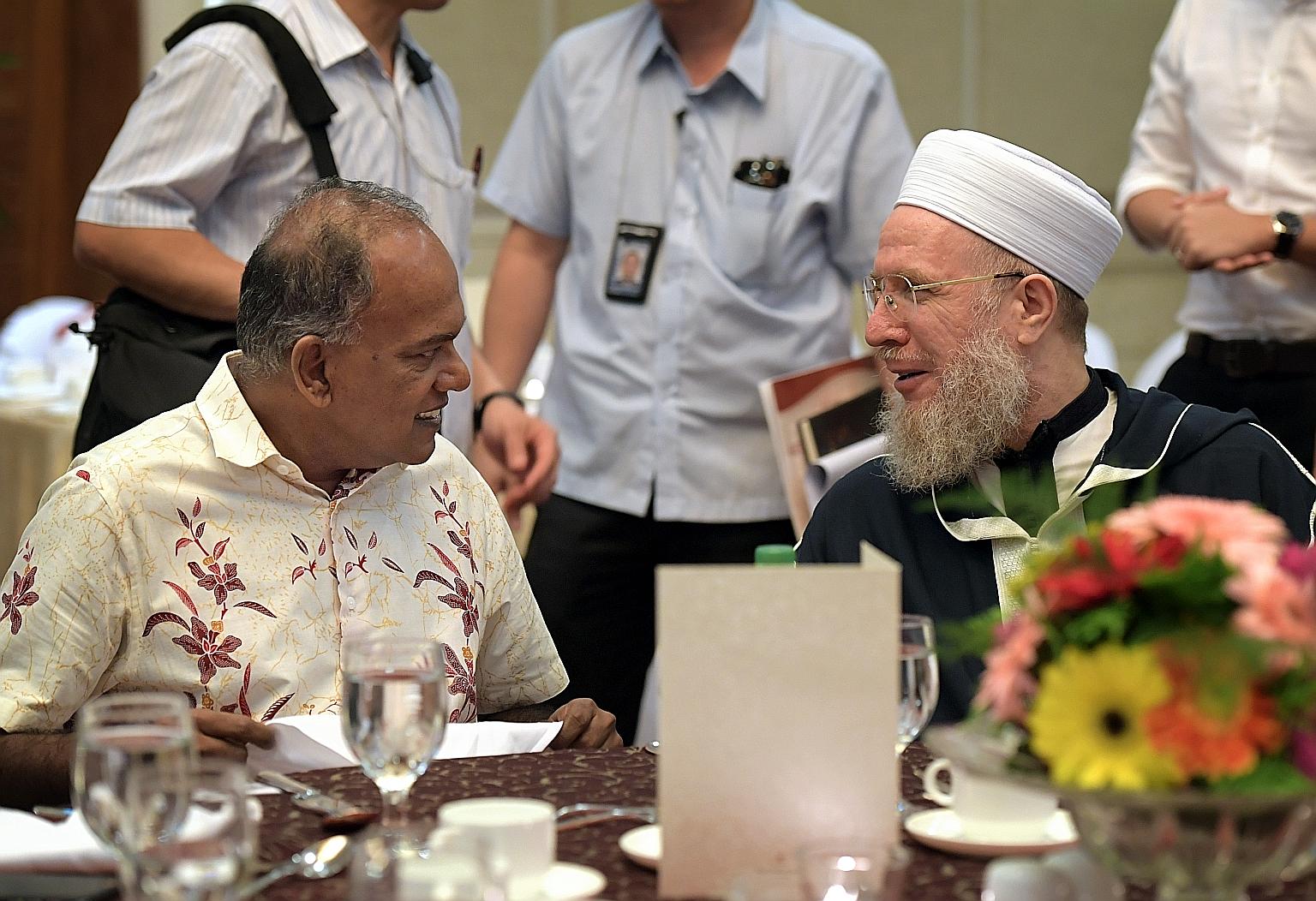Self-radicalised people harder to rehabilitate: Shanmugam
They have more complex social and psychological issues, rely on Internet for information, he says
Sign up now: Get ST's newsletters delivered to your inbox

Home Affairs Minister K. Shanmugam speaking with Syrian Islamic scholar Shaykh Sayyid Muhammad Al-Yaqoubi at the Religious Rehabilitation Group's 14th Annual Retreat yesterday.
ST PHOTO: ALPHONSUS CHERN
Seow Bei Yi
Follow topic:
Self-radicalised individuals today face "more complex psychological and social issues" and Singapore is still trying to develop the right tools to rehabilitate them, Home Affairs Minister K. Shanmugam said yesterday.
To date, just 25 per cent of such individuals nabbed since 2007 have been released.
Self-radicalised people, who tend to be influenced by material online, are different from the wave of Jemaah Islamiah (JI) detainees caught here after the Sept 11 attacks in 2001, said Mr Shanmugam, who is also Law Minister.
Among the JI detainees, generally recruited directly by the South-east Asian terrorist group itself, 88 per cent have been rehabilitated so far. There were about 40 Singaporean JI or JI-linked individuals arrested or detained at various points.
But it has been harder to rehabilitate self-radicalised people, said Mr Shanmugam. "They hold on to their beliefs, they have a very limited understanding of Islam, they absorb whatever they see on the Internet, and they go with those views," he said. The problem has worsened with the emergence of the Islamic State in Iraq and Syria (ISIS) in the past four to five years, he added.
Radicalised individuals caught now are also getting younger. Since 2015, the authorities have picked up five teens aged between 17 and 19. "We find a common thread when we pick them up. A heavy reliance on the Internet, social media, for information, including religious teachings," said Mr Shanmugam.
"That is where the extremists, the terrorist groups operate and infect others with their propaganda."
The minister was speaking at the 14th annual retreat of the Religious Rehabilitation Group (RRG), which was set up to provide guidance to JI detainees.
Today, the voluntary group of Islamic scholars and teachers has broadened its scope to include counselling self-radicalised individuals and those who support ISIS.
On what more needs to be done, Mr Shanmugam said a key task for the Government is to encourage grea-ter integration among citizens. There is also a need to get young people to visit mosques and listen to accredited preachers, and to further their understanding of Islam, he added.
In that vein, the minister yesterday launched a new initiative to provide Muslim youth with a better understanding of their religion.
Called the RRG Awareness Programme for Youth, it is targeted at those aged between 16 and 25, said RRG vice-chairman Mohamed Ali. Among other things, it aims to help them understand the dangers of extreme thoughts and ideology.
Experts who spoke to The Straits Times agreed that self-radicalisation poses a different challenge.
The mindset of a self-radicalised person varies by individual, making him harder to predict and deal with, said Professor Rohan Gunaratna, head of the International Centre for Political Violence and Terrorism Research. In contrast, those radicalised by groups go through a teacher or recommended text.
He added: "The clerics, psychologists and social workers who engage 'group-radicalised' personalities know their mindsets."
On what more should be done to combat self-radicalisation, Dr Mohamed said the approach to religious education has to change.
"The approach to teaching Islam has to change... and every head of the family needs to teach their children not only how to pray, how to fast, but also the importance of practising Islam in the context we are living in today," he said.

